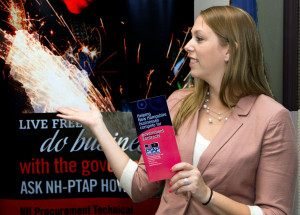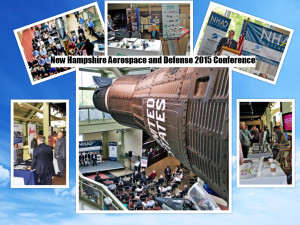Archive for June, 2015
Thursday, June 25th, 2015
Happy New Year! No, you didn’t miss the ball drop in Times Square – the new fiscal year just started for the state of New Hampshire, so for this edition of 5 Questions, we interviewed Carmen Lorentz, director of the Division of Economic Development.
For those of you who don’t know her, Lorentz has been the division’s director since January 2014. Prior to her appointment, she served as director of the Belknap Economic Development Council and previously analyzed state economic development policies at New York’s Public Management Institute.
 Carmen Lorentz ~ Division of Economic Development 1. What are your priorities for the coming year?
We are working to provide new services to our local partners. One new tool we have is called EMSI (Economic Modeling Specialists, Intl), which we can use to help communities and organizations with grant writing, strategic planning and economic impact analysis of projects. For example, right now we are working on an economic impact study with the Concord Lake Sunapee Rail Trail group to show how much new visitor spending and jobs could be generated along the trail if it is built. We also support the New Hampshire High Tech Council by providing it with quarterly data on changes in employment and occupations in all of New Hampshire’s high-tech sectors. There is no fee for this service.
Another tool we hope to unveil in January is a site selection website. It will enable companies looking for a new location for their business to easily identify buildings or sites that meet their needs and to analyze demographic, workforce and industry data in a customized geography around the sites they are interested in – all on their smart phone or tablet. This kind of tool has quickly become the industry standard in economic development. It will expand our marketing reach for out-of-state business attraction and will help local economic development organizations market communities and properties.
2. What are some of the best-kept secrets of the division?
People are often surprised to learn that our work supported the creation and retention of 8,260 jobs in New Hampshire last year. That is based primarily on three things: the 17 companies and 1,200 new jobs that our recruitment team helped bring to the state; the $650 million in federal contracts that 115 of our government contracting team’s clients obtained, and the $4.5 million in global sales that our international commerce team helped 13 companies land. The state invested $2.1 million in us last year, so that’s about $260 per job. Not a bad return on investment if you ask me.
3. Many out-of-state businesses are considering a move or expansion to New Hampshire. What are the most compelling reasons, in your eyes, for choosing the Granite State over the competition?
Many companies that choose New Hampshire are drawn here because we offer a low tax environment and an exceptional quality of life – low crime, low poverty, low unemployment and highly educated and healthy people. When companies work with us here at the division, they also see how easy it is to get things done in our small and very connected state. Since time is money, that can make a big difference and we get a lot of positive feedback on how responsive and business-friendly our state is compared to other places.
4. What do you see as the biggest challenge facing New Hampshire businesses today and how is the division working to help businesses overcome these challenges?
Workforce. That is the number 1 thing we hear about from the companies with which we work. Many companies could grow faster if they could find people with the right skills. A generation ago, New Hampshire’s economic growth was bolstered by the fact that we attracted a lot of new, very highly educated people to our state. In-migration has slowed considerably, so if we are going to grow our economy, we have to do a better job of making sure that New Hampshire residents understand where the opportunities are and have clear and affordable pathways to good careers.
Here at the division, we are developing a more systematic approach to create partnerships that respond to workforce needs. We had a recent success where Cindy Harrington, one of our business development managers, was working with GE Aviation on it expansion in Hooksett. Officials there expressed a need for people with skills in tube fabrication and formation. Cindy brainstormed with others on our team and identified companies around the state with similar training needs, including Scotia Technology, Titeflex Aerospace, Axenics and ContiTech Thermopol. She convened those companies with the Community College System of New Hampshire and together they created a 10-week certificate program in tube fabrication and formation, which will be offered by Manchester Community College starting this fall. This program will enable people who are not from a manufacturing background to acquire the skills needed for potential employment opportunities at these five companies and others.
We are also working to create a framework based on this example for our staff and partners to use in responding to a company that expresses a need for workers with specialized skills, so that we can ensure the right resources are brought to the table to address the need.
5. The What’s So Cool About Manufacturing? video contest was very successful! Any plans to do it again?
Yes! We will launch the 2016 contest in September. Any middle school teachers who are interested should contact Lorna Colquhoun at lorna.colquhoun@dred.nh.gov or 271-2341 to get on the distribution list for the contest materials. You can see the videos from the 2015 contest on our YouTube channel.
Tags: Carmen Lorentz, NH Division of Economic Development, what's new
Posted in NH Business Matters | Comments Off on 5 Questions with Carmen Lorentz, NH Division of Economic Development
Wednesday, June 24th, 2015
https://youtu.be/72_FFuHgBrA
Carmen Lorentz, left, and Tina Kasim ~ NH Economy
More and more New Hampshire companies are exporting, which helps them find new customers and markets and diversify their sales.
The New Hampshire Office of International Commerce works with those companies every day and seeks out new global markets.
This month’s New Hampshire Business Matters radio show (every third Wednesday of the month on WTPL 107.7 FM ), Division of Economic Development Director Carmen Lorentz and Office of International Trade program manager Tina Kasim discuss the upcoming opportunities, including the trade mission to Colombia; the Dubai Air Show and Arab Health.
Tune in! For more information, visit ExportNH.org.
Tags: global trade, NH Office of Internation Commerce, trade missions, trade shows
Posted in NH Business Matters | Comments Off on Office of International Commerce Update: Opportunities Abound Abroad
Monday, June 22nd, 2015
 Bath Covered Bridge New Hampshire’s summer season is expected to set records, as state tourism officials anticipate an increase in visitors and visitor spending.
According to the Institute for New Hampshire Studies report, more than 15.9 million people will visit from out-of-state during the summer season, 3 percent more than last summer, who may spend about $2.07 billion, up 3 percent from a year ago.
June, July and August see the largest number of people visiting the state of any three-month travel season, accounting for more than 40 percent of all visitors and visitor spending on an annual basis.
Most visitors to New Hampshire this summer will be from New England, the Middle Atlantic States, and eastern Canada. The number of people visiting from Europe is expected to increase by about 3 percent over summer 2014, with United Kingdom, French and German travel to New Hampshire expected to improve.
VisitNH.gov has a new look for summer. The Vacation Inspiration website has tips and suggestions on how to get the most out of summer. Some of the highlights include unique garden tours, unexpected concert venues, kid-friendly hikes, top amusements and natural attractions and much more. Stay connected with New Hampshire tourism on Facebook, Twitter, Instagram, Pinterest and YouTube and be sure to follow the #livefreenh hashtag to see what other people are saying about summer in New Hampshire.
Tags: 2015 travel forecast, summer in NH, visitnh.gov
Posted in NH Business Matters | Comments Off on Summer of 2015: 15.9 Million Visitors Expected to Spend $2 Billion in New Hampshire
Friday, June 19th, 2015
We’ve covered some of the higher-level facets of federal government contracting in previous “5 Questions” interview pieces, and this time, we decided to dig a little deeper into the space – looking at state and local opportunities, and what it’s like for a company to actually work with a procurement service.
To guide us in this area, we interviewed Amanda Duquette, procurement specialist with the New Hampshire Procurement Technical Assistance Program (NH-PTAP). Her day-to-day work includes one-on-one counseling with New Hampshire businesses selling their products or services, either directly to the local, state, and federal government or indirectly through subcontracting, as well as performing marketing research and creating strategic plans for companies to get the training and technical assistance they need to come up to speed for government contracting opportunities.
1. You’ve been with PTAP since 2007 and have worked with many, many businesses. How vital would you say PTAP’s services are to the overall success of those companies?
 Amanda Duquette Most of the clients that we help come to us because they aren’t sure how to best pursue government contracts. There are many registrations and processes that need to be completed before a company can be awarded a government contract. We help companies navigate through the red tape and we basically walk them through the entire process. There are many rules and regulations that go along with contracting with the government – and they are constantly changing. I think PTAP’s services are vital to companies who want to successfully work for the government.
2. What kinds of assistance are requested most often by New Hampshire businesses?
Many of our clients are new to the government contracting arena. They are looking for assistance with government registrations and how to find government contracts that are a good fit for their company. They want us to teach them how to set their business up to work for the government and then how to find and pursue government work.
3. Much of the PTAP talk is about federal contracts, but you help with state and local contracts, too. Can you give us a sense of the variety of products and services needed at state and local levels?
There is a vast variety of products and services that are needed at the state and local level. There is usually a need for janitorial services, landscaping/snow plowing, construction/renovation work and automotive equipment. We also see needs for medical and professional services, laboratory equipment and hardware. Our Bidmatch service helps our clients get easy access to bidding opportunities that are found on the state and individual city and town websites, or published in the newspapers.
4. What kind of market research will you perform for clients interested in exploring contracting opportunities?
PTAP counselors do a lot of market research for our clients. We often have clients who want to know if the government is buying their products or services. We take our clients on virtual tours to show them what agencies are buying their products or services. We can show them who their competitors are and what they are selling to the government and we can also show them competitor’s prices and sales amounts. We also teach our clients how to search for government contracts. If our client isn’t ready for direct government contracts, we show them how to find subcontracting opportunities.
5. Sometimes your clients aren’t quite qualified or otherwise capable of contracting with the government. What does PTAP do to help train or otherwise help these companies get to the point of being a suitable contractor?
You are right, not every company that comes to us is ready for government contracting. When we first speak with a new client, we assess his/her company – taking into consideration, its products/services, time in business, past performance and commercial market. We often recommend that companies that are not ready for direct government work reach out to prime contractors, to become a subcontractor for a piece of the project or work. This helps them get their feet wet with government work and helps them understand what it takes to complete a government contract. Also, when a company is a new start-up or not ready for our services, we usually refer them to our partners at the Small Business Development Center (SBDC) and/or SCORE.
Tags: 5 Questions, doing business with the government, federal contracting, government contracting, NH-PTAP
Posted in NH Business Matters | Comments Off on 5 Questions with Amanda Duquette, NH PTAP
Monday, June 15th, 2015
The first-ever New Hampshire Aerospace and Defense Conference was held June 10 and if success is measured in enthusiasm and momentum, then we can safely say it reached new heights at this event.
More than 225 people attended and 31 vendors were featured at the McAuliffe-Shepard Discovery Center. Building the Supply Chain for New Hampshire’s Aerospace and Defense Export Markets was the theme of what will become an annual event, organized by the New Hampshire Aerospace and Defense Export Consortium; the New Hampshire Division of Economic Development and the New Hampshire Manufacturing Extension Partnership, with sponsorship by BAE Systems.
 Click to view larger Paul Kling, deputy vice president of operations and supplier partnerships for BAE, was the keynote speaker and two panel discussions covered topics relating to export strategies.
Why is this kind of gathering important? Aerospace and defense are two fast growing sectors in our state, which is home to about 350 companies involved in these industries. More than 7,000 people are employed and the average salary hovers around $97,000.
In short, aero/defense is important to our economy and whenever we can bring people from the industry to talk, exchange ideas and share enthusiasm, it’s a good day.
Lorna Colquhoun
Communications Director
Division of Economic Development
Posted in NH Business Matters | Comments Off on Aerospace: New Hampshire H-O-T Commodity
Friday, June 12th, 2015
Since 1988, the New Hampshire High Technology Council has given an annual “Entrepreneur of the Year” (EOY) award, honoring New Hampshire entrepreneurs for demonstrating leadership, ingenuity and innovation in the technology sector. Last month, the NHHTC named Southern New Hampshire University (SNHU) as one of its 2015 winners, for “utilizing technology in truly unique, powerful and very different ways,” said Matt Benson, chair of the NHHTC’s EOY committee.
 SNHU President Paul LeBlanc To learn more about how SNHU earned this award, we interviewed Paul LeBlanc, president of SNHU. LeBlanc has held the post since 2003, and is no stranger to winning awards. In 2012, SNHU was the only academic institution on Fast Company magazine’s World’s 50 Most Innovative Companies list. LeBlanc has also won a New England Higher Education Excellence Award, was named one of New Hampshire’s Most Influential People by New Hampshire Business Review, and named one of 15 Classroom Revolutionaries by Forbes Magazine.
Congratulations on receiving the Entrepreneur of the Year Award! It seems unusual at first blush to think of an 83-year-old university with 60,000 students as ‘entrepreneurial.’ How do you believe SNHU embodies the entrepreneurial spirit?
Thank you! It really was an honor. Fundamentally, I think we are always asking ourselves “Is there a better way to serve our students? To reach more students who need a degree?” and never being self-satisfied. That translates into a set of behaviors: a willingness to try new things, take risks, and make mistakes. Those behaviors then get shaped into a game plan, very much informed by innovation guru Clay Christensen. Clay was a trustee and is now Trustee Emeritus, and his research and writing on disruption have been very influential for us as a university.
People often assume that size means less willingness to innovate and be entrepreneurial, but it doesn’t have to. Especially when you’re willing to create new, small and agile teams, and then give them the running room to try things, break some rules, and invent.
Why, in your opinion, is being entrepreneurial an important quality for educational institutions?
Higher education is in a kind of perfect storm: a combination of massive state disinvestment in public higher education, demographic downturn, worries over high prices and excessive student debt, and new delivery models. The old answers of turning to alumni donors, requests for more state funding, building a new stadium, and living off grants won’t suffice. Higher education is similar to the health care industry, highly regulated with a lot of third-party dollars (namely, $153 billion of federal financial aid), so change will come more slowly. But change is happening and it’s pretty dramatic.
SNHU is now particularly known as an innovator in its field, but that wasn’t always the case. What had to change inside the institution for it to become more innovative?
Honestly, I think we’ve long been innovative. We did satellite continuing education centers decades ago and before they were common. We were early into online education. We were doing competency-based degrees and three-year degrees some 16 years ago. Traditional higher education has always tended to look down its nose at that sort of innovation, so I think we were not recognized for it. Now, higher education is catching up with those innovations – in some large measure because it is forced to find new ways to operate – and we look more innovative. I don’t think we are; I think higher education is finally getting more innovative and embracing things we have been doing for a long time.
Innovation is in our DNA given that history, and we continue that tradition today. I think if you were to ask the higher education press to name the three or four most innovative universities in the country, SNHU would be on everyone’s list.
How is SNHU working to support the broader business community in New Hampshire? Put another way, what impact do you strive to have on the economic growth of the state?
Well, there is the obvious connection, with our rapid growth; we have hired roughly 4,500 full and part time staff in five years. We moved our online operation to the mill yards of Manchester six years ago and had 22 people there. Today we have 1,200. We have a new facility at 1230 Elm St., and have put another 250 people there and will add more. That’s a huge boon to the downtown merchants. Then there’s the building program we have had underway, going from 10,000 square feet of space downtown to over 220,000 square feet. That’s meant build outs, furnishings, HVAC, and more — all work for largely local subcontractors and suppliers. On the main campus, during that same period, we’ve built over $120 million of new facilities – again, a lot of work for local contractors and others. Only Dartmouth College has more international students than we do and an annual independent study indicates that our 1,000 international students have about a $32 million economic impact on the area.
Then you think about the way we supply talent into the local labor market, a critical need for the business community, and the impact of the university is just enormous. Our IT, Finance, Marketing, Math, Hospitality, Communications, and many other majors graduate and become part of the larger talent pool the state so desperately needs. Our online programs, catering mostly to adults, are the second largest in the country and by far the largest in the region. We have thousands of adults with some to no college credits coming back, completing degrees, and retooling for the labor market.
Can you give us a hint about what new trails SNHU will soon be blazing in the academic world?
Well, we just created a new software company, Motivis Learning, and based it in Salem. We have high hopes for that company (it’s our one for-profit subsidiary), and institutions from around the country are adopting its next generation learning platform. We just announced that Anthem has rolled out our competency-based degree program, College for America, to all 55,000 of its employees – expect more such partnerships in the future. We’re doing some really exciting partnerships with other providers too. For example, we have a new Music Industry MBA in partnership with the Berklee School of Music. We are in discussions with others for similar kinds of offerings. We just received a $3.9 million First in the World federal grant to pioneer new remedial education approaches. It’s such an exciting time in higher education, for all its challenges and its uncertain future. But as Steve Jobs said, “The best way to predict the future is to invent it.”
Tags: 5 Questions, entrepreneurship, Paul LeBlanc, Southern NH University
Posted in NH Business Matters | Comments Off on 5 Questions with SNHU President Paul LeBlanc
|














